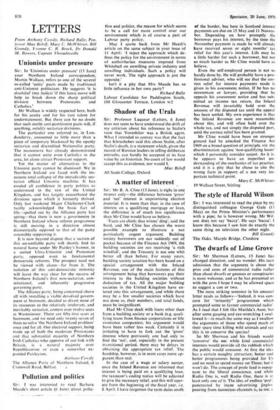A matter of interest
Sir: Mr R. A. Cline (13 June), is right in one respect only—the difference between 'gross' and 'net' interest is unpromising election material. It is more than that; in the case of interest on a qualifying mortgage or loan, the difference is of much less significance than Mr Cline would have us believe.
`Facts are chiels that winna' ding', said the bard, and Mr Cline has chosen the worst possible example to illustrate a not particularly cogent argument. Building society borrowers are not suddenly out of pocket because of the Finance Act 1969, the building societies are not receiving 'a rich windfall', and the Treasury is not one whit better off than before. For many years, building society taxation has been based on a special arrangement with the Inland Revenue, one of the main features of this arrangement being that borrowers pay their interest to the building societies without deduction of tax. All the major building societies in the United Kingdom have en- tered into this arrangement, and while there may be a few smaller societies which have not done so, their numbers, and total funds, must be insignificant.
Had Mr Cline dealt with loans other than from a building society or a bank (e.g. quali- fying loans from finance corporations or life assurance companies), his argument would have been rather less weak. Certainly it is irritating to have to fork out the `gross' interest where previously one had only to find the 'net', and, especially in the present transitional period, there may be delays in obtaining the appropriate tax relief. The hardship, however, is in most cases more ap- parent than real.
In the case of a wage or salary earner, once the Inland Revenue are informed that interest is being paid on a qualifying loan, the taxpayer's coding notice will be adjusted to give the necessary relief, and this will oper- ate from the beginning of the ;fiscal year, i.e. 6 April. I have forgotten the term dates south
of the border, but here in Scotland interest payments are due on 15 May and 11 Novem- ber. Depending on how promptly the borrower pays his interest, by the time the November payment is made he will already have received seven or eight months' tax relief for this year's interest. Life may be a little harder for such a borrower, but not so much harder as Mr Cline would have us believe.
Even the self-employed person is not so hardly done by. He will probably have a pro- fessional adviser, who will see that the cor- rect relief for interest payments made is given in his assessment notice. If he has no accountant or lawyer, providing that he appeals his assessment notice and has sub- mitted an income tax return, the Inland Revenue will invariably hold over the amount of the disputed tax until the appeal has been settled. My own experience is that the Inland Revenue are most reasonable about this, and will often hold over the whole tax, and not simply the disputed part, until the correct relief has been granted.
Mr Cline would have been on stronger ground had he attacked the Finance Act 1969 on a broad question of principle, viz, the discrimination against `non-qualifying loans' which I personally consider unjust. As it is. he appears to have an imperfect un- derstanding of the mechanics of tax practice. and it is a pity that he chose to cite the wrong facts in support of a not very im- portant technical point.


































 Previous page
Previous page